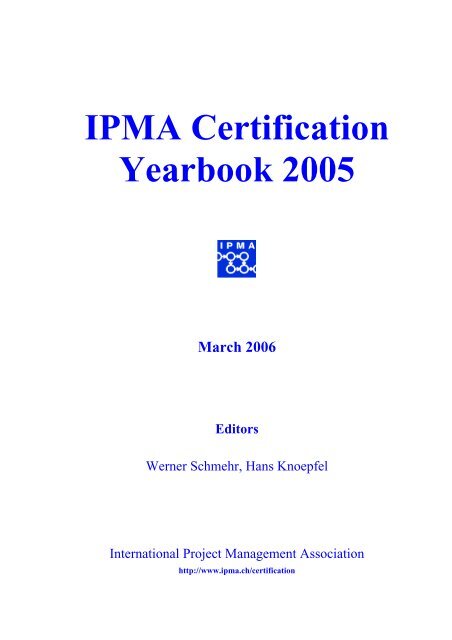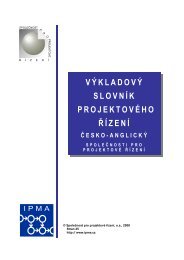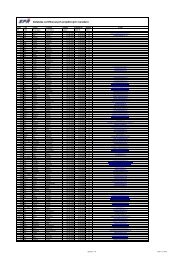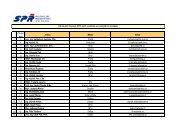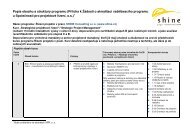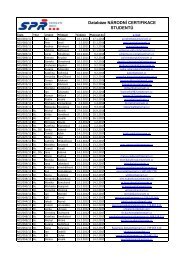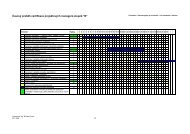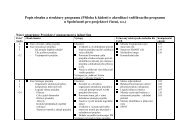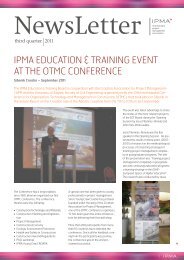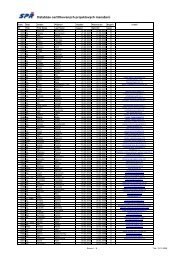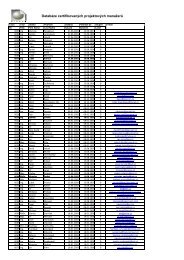IPMA Certification Yearbook 2005
IPMA Certification Yearbook 2005
IPMA Certification Yearbook 2005
You also want an ePaper? Increase the reach of your titles
YUMPU automatically turns print PDFs into web optimized ePapers that Google loves.
<strong>IPMA</strong> <strong>Certification</strong><br />
<strong>Yearbook</strong> <strong>2005</strong><br />
March 2006<br />
Editors<br />
Werner Schmehr, Hans Knoepfel<br />
International Project Management Association<br />
http://www.ipma.ch/certification
International Project Management Association <strong>IPMA</strong> <strong>Certification</strong> <strong>Yearbook</strong> <strong>2005</strong><br />
2<br />
© <strong>2005</strong> International Project Management Association Version 1.00 / 31.03.2006
International Project Management Association <strong>IPMA</strong> <strong>Certification</strong> <strong>Yearbook</strong> <strong>2005</strong><br />
3<br />
Table of Content<br />
1 Preface ...............................................................................................................................4<br />
2 <strong>IPMA</strong> <strong>Certification</strong> Programme Status..........................................................................5<br />
3 Four Level <strong>Certification</strong> Programmes............................................................................6<br />
3.1 Overview.......................................................................................................................... 6<br />
3.2 <strong>Certification</strong> System......................................................................................................... 6<br />
3.3 General Structure and Principles...................................................................................... 8<br />
3.4 Organisation and Administration ..................................................................................... 9<br />
3.5 Worldwide Cooperation................................................................................................. 10<br />
3.6 National Competence Baselines..................................................................................... 10<br />
3.7 Standards........................................................................................................................ 13<br />
3.8 <strong>IPMA</strong> Competence Baseline (ICB)................................................................................ 13<br />
4 Number of Certificates...................................................................................................16<br />
4.1 <strong>IPMA</strong> Level A ..................................................... 16<br />
4.2 <strong>IPMA</strong> Level B ..................................................... 17<br />
4.3 <strong>IPMA</strong> Level C ..................................................... 18<br />
4.4 <strong>IPMA</strong> Level D ..................................................... 19<br />
5 Assessors of the <strong>Certification</strong> Bodies ............................................................................22<br />
5.1 List of First Assessors ..................................................... 22<br />
5.2 List of Actual Assessors ....... 25<br />
6 <strong>Certification</strong> Bodies ........................................................................................................30<br />
7 <strong>IPMA</strong> Validation ............................................................................................................34<br />
7.1 <strong>Certification</strong> Validation Management Board ................................................................. 34<br />
7.2 List of Validations.......................................................................................................... 35<br />
7.3 <strong>Certification</strong> Validation Panel <strong>2005</strong> Paris...................................................................... 36<br />
© <strong>2005</strong> International Project Management Association Version 1.00 / 31.03.2006
<strong>IPMA</strong> <strong>Certification</strong> <strong>Yearbook</strong> <strong>2005</strong><br />
4<br />
International Project Management Association<br />
1 Preface<br />
The universal <strong>IPMA</strong> Four Level <strong>Certification</strong> (4-L-C) system became operational in 1998 officially and<br />
world-wide after several years of development in our national associations.<br />
The certification programme of a member association starts with the nomination of the first assessors,<br />
the establishment of the certification body engaging important sectors of the economy, and the transfer<br />
of the <strong>IPMA</strong> Competence Baseline (ICB) to the National Competence Baseline (NCB) or the direct<br />
usage of <strong>IPMA</strong>’s ICB in the <strong>Certification</strong> Bodies Rules. The own assessors are trained during the first<br />
certification cycle with the assistance of an experienced assessor from an existing certification body.<br />
The <strong>IPMA</strong> approved first assessors are responsible for the validity of the system until the first validation<br />
process with the standard validation procedure is done by <strong>IPMA</strong>.<br />
The list of the certificates is not a part of the <strong>IPMA</strong> <strong>Certification</strong> <strong>Yearbook</strong>. The list is on the <strong>IPMA</strong> website<br />
(www.ipma.ch). Certificants can be searched and identified by name, country, level of their actual<br />
certificate with date of issue and expiry date. The list is updated at least every six months.<br />
In the year <strong>2005</strong>:<br />
• The <strong>IPMA</strong> level descriptions and the streamlined pyramid figure were applied worldwide as a basis<br />
for the training and certification of project management personnel.<br />
• The certification bodies of thirty national member associations were in operation. The great performance<br />
and the continuing high growth rates of the leading countries demonstrate how much<br />
potential is in the system.<br />
• The <strong>IPMA</strong> validation with the standard <strong>IPMA</strong> validation procedure was finished in Finland and<br />
Russia.<br />
• The individual certificates, the reduced version of the <strong>IPMA</strong> Competence Baseline (ICB) and the<br />
<strong>Certification</strong> <strong>Yearbook</strong> 2004 was available on the <strong>IPMA</strong> website.<br />
• <strong>IPMA</strong>’s large development project for revising the ICB during the years 2004 and <strong>2005</strong> is completed,<br />
the revised ICB will be published in May 2006.<br />
• Again a great quantitative growth in the project management certification was realised in the year<br />
<strong>2005</strong>. Until the end of <strong>2005</strong> about 45'500 certificates were awarded in total.<br />
• The <strong>IPMA</strong> four level certification system is continuing to animate a great professional development<br />
of the <strong>IPMA</strong> Member Associations and their members.<br />
The ICB as a global standard, the National Competence Baselines, the certification programmes of the<br />
national certification bodies and the global companies cooperating with <strong>IPMA</strong> are major flywheels for<br />
the project management promotion world-wide.<br />
Other empowering components are the bilateral co-operations between existing certification bodies<br />
and certification bodies that start a new programme.<br />
More and more project managers prefer <strong>IPMA</strong>'s four level system which fits to the personal development<br />
and career of individuals as well as to the competitiveness of the companies and the project<br />
management competence of their personnel.<br />
The Editors of the <strong>IPMA</strong> <strong>Certification</strong> Validation Management Board<br />
Werner Schmehr<br />
Member<br />
Hans Knoepfel<br />
Member<br />
Note<br />
The information in this yearbook may contain errors or non-actual information due to an imperfect retrieval, transfer or interpretation<br />
of data from the national certification bodies.<br />
<strong>IPMA</strong> endeavours to present correct data. However, <strong>IPMA</strong> does not accept any liability for the completeness and correctness of<br />
the information.<br />
To be sure it is necessary to contact the national certification body for getting the latest information.<br />
Version 1.00 / 31.03.2006<br />
© <strong>2005</strong> International Project Management Association
International Project Management Association <strong>IPMA</strong> <strong>Certification</strong> <strong>Yearbook</strong> <strong>2005</strong><br />
5<br />
2 <strong>IPMA</strong> <strong>Certification</strong> Programme Status<br />
Status January 2006<br />
Country agree- valida- Level 3)<br />
(member assoc. / certif. body) ment 1) tion 2) A B C D<br />
Austria (pma / zertifizierungsstelle) S V R RV 2) RV RV<br />
Azerbaijan (AZPMA) S VP R R R<br />
Brazil S R R R<br />
Bulgaria (BPMA) S P<br />
China P.R. (PMRC) S V RV RV RV RV<br />
Croatia S VP P R R R<br />
Czech Republic (SPR) S VP R R R<br />
Denmark (DPMA / CERT) S V R RV RV RV<br />
Egypt (MES / MPC) S V RV RV RV RV<br />
Finland S V/VP RVP RVP RV RVP<br />
France (AFITEP) S V RV RV RV RV<br />
Germany (GPM / PM-ZERT) S V RIV 4),6) RIV 4),6) RIV 4),6) RIV 4),6)<br />
Greece (HPMI)<br />
S<br />
Hungary (PMPEF) S V RV RV RV RV<br />
Iceland (VSF-CB) S VP R R R<br />
India (PMA) S P P R<br />
Ireland (PMI Ltd.) S V P RV RV RV<br />
Italy (ANIMP / PM-Sect) S VP R R R R<br />
Kazachstan (KPMA) S P<br />
Kuwait (KSE / KBMCB) S P<br />
Latvia (Latvia-PM-Cert) S P R<br />
Netherlands (PMI-NL/CitoCert) S V RIV RIV RIV RIV<br />
Norway (NFP) S R R R<br />
Poland (SPMP-Cert) S R R R R<br />
Portugal (APOGEP / Cert) S V RV RV RV<br />
Romania (PMR-Cert) S R R R<br />
Russia (SOVNET-CERT) S V RV RV RV RV<br />
Serbia-Montenegro (YUPMA) S P P P<br />
Slovak Rep. (SIPR / SPPR) S VP P R R R<br />
Slovenia (Slo Cert) S VP R R R R<br />
South Africa (APMSA-Cert) S P P P P<br />
Spain (AEIPRO / OCDP) S R R R<br />
Sweden (SPF) S VP P R R R<br />
Switzerland (SPM / VZPM) S V RA 5) V RA 5) V RA 5) V RA 5) V<br />
Taiwan, China (TPMA) S P<br />
Ukraine (UPMA / Cert) S V RIV RIV RIV RIV<br />
United Kingdom (APM) S R R R<br />
United States (asapm/PMCert) S P P<br />
38 14+(8) 15(+6) 28(+5) 28(+4) 30(+7)<br />
1) S: signed by end of <strong>2005</strong> or P: planned in 2006 or no plans until 2006 (empty)<br />
2) V: validated by end of <strong>2005</strong> with standard procedure or VP: planned in 2006 or no plans until 2006 (empty)<br />
3) R: realised by end of <strong>2005</strong> or P: planned in 2006 or no plans until 2006 (empty)<br />
4) I: ISO 9001 Certified<br />
5) A: Accredited (European Accreditation)<br />
6) A: Accreditation ISO/IEC 17 024 in progress<br />
© <strong>2005</strong> International Project Management Association Version 1.00 / 31.03.2006
<strong>IPMA</strong> <strong>Certification</strong> <strong>Yearbook</strong> <strong>2005</strong><br />
6<br />
International Project Management Association<br />
3 Four Level <strong>Certification</strong> Programmes<br />
3.1 Overview<br />
The International Project Management Association (<strong>IPMA</strong>) is a non-profit organisation, whose function<br />
is to be the prime promoter of project management (PM) internationally.<br />
<strong>IPMA</strong> started in 1965, under its former name of INTERNET, as a forum for the exchange of experience<br />
amongst project managers of international projects. It hosted its first international conference in<br />
1967 in Vienna, and since that time has developed steadily, as indeed has the discipline of project<br />
management itself.<br />
The membership of <strong>IPMA</strong> is primarily of national project management associations. The about 40<br />
member associations serve the specific needs of project management professionals in their own country<br />
in their own language. <strong>IPMA</strong> develops those needs at the international and global levels.<br />
To achieve this aim <strong>IPMA</strong> has developed a number of services encompassing research and development,<br />
education and training, standards and certification as well as conferences, seminars and<br />
workshops supported by a range of publications. In addition to its member associations, there are a<br />
number of other cooperating organisations and individual members who work with <strong>IPMA</strong> to promote<br />
project management internationally.<br />
An individual or company automatically supports <strong>IPMA</strong> if they become a member of a project management<br />
association which is a member of <strong>IPMA</strong>. If there is no Member Association in a country, then<br />
direct ‘international’ membership is available to them and the certification can be done with an existing<br />
certification body.<br />
The benefits of membership include:<br />
• Extensive networking opportunities<br />
• Promotion and support for conferences<br />
• Panels and workshops for exchange of experience<br />
• Internationally recognised qualification and certification<br />
• Participation in international research projects<br />
• International award<br />
• Bi-monthly International Journal<br />
• Quarterly Newsletter<br />
• Reduced entry fee for conferences.<br />
3.2 <strong>Certification</strong> System<br />
On June 14, 1998 in Ljubljana, Slovenia, the <strong>IPMA</strong> Council confirmed the establishment of <strong>IPMA</strong>'s<br />
universal four level system which was approved on February 28, 1998 in Bled. The certification programmes<br />
in project management were then going to be realised by the Member Associations.<br />
The certification schemes and systems of the certification bodies (as defined in the ISO/IEC standard<br />
17024) shall be an incentive for the project managers and the members of the project management<br />
teams (i.e. the project management personnel) to<br />
• expand and improve their technical, behavioural and contextual PM competence<br />
• continue their education and experience in PM<br />
• improve the quality of project management<br />
• last but not least – achieve the project objectives better.<br />
Version 1.00 / 31.03.2006<br />
© <strong>2005</strong> International Project Management Association
International Project Management Association <strong>IPMA</strong> <strong>Certification</strong> <strong>Yearbook</strong> <strong>2005</strong><br />
7<br />
The benefits of the certification are<br />
• for the project management personnel:<br />
an internationally acknowledged certificate of their PM competence<br />
• for the suppliers of project management services:<br />
a demonstration of their employees' professional competence<br />
• for the clients:<br />
more certainty to get the state-of-the-art services from project management professionals.<br />
For these purposes, a variety of competence elements of the project management personnel concerning<br />
the knowledge and experience in the technical, behavioural and contextual range are assessed.<br />
<strong>IPMA</strong> developed the universal four-level concept for the certification processes and scheme.<br />
The certification processes, scheme and system of a certification body that abides by the rules of<br />
<strong>IPMA</strong> will be validated and revalidated on a regular basis by <strong>IPMA</strong>.<br />
The main requirements for each level are derived from typical activities, responsibilities and requirements<br />
from practice. The <strong>IPMA</strong> four level certification is now shown as follows:<br />
Title Competence <strong>Certification</strong> Process Validity<br />
Stage 1 Stage 2 Stage 3<br />
Certified<br />
Projects<br />
Director<br />
(<strong>IPMA</strong> Level A)<br />
A<br />
Projects<br />
director report<br />
Certified<br />
Senior Project<br />
Manager<br />
(<strong>IPMA</strong> Level B)<br />
Certified<br />
Project<br />
Manager<br />
(<strong>IPMA</strong> Level C)<br />
knowledge,<br />
experience<br />
B<br />
C<br />
Project report<br />
Written exam.<br />
Options:<br />
work-shop,<br />
short project<br />
report<br />
Application,<br />
Curriculum<br />
vitae,<br />
project list,<br />
references,<br />
self assessment<br />
Interview<br />
5 years<br />
Certified<br />
Project<br />
Management<br />
Associate<br />
(<strong>IPMA</strong> Level D)<br />
knowledge<br />
D<br />
Application,<br />
Curriculum<br />
vitae, self<br />
assessment<br />
Written exam<br />
not<br />
limited<br />
option:<br />
10<br />
years<br />
Figure 1 <strong>IPMA</strong> Four Level <strong>Certification</strong> System<br />
<strong>IPMA</strong> Level A Certified Projects Director<br />
Shall be able to direct all projects of a company or branch or all projects of a programme.<br />
<strong>IPMA</strong> Level B Certified Senior Project Manager<br />
Shall be able to manage complex projects him / herself.<br />
<strong>IPMA</strong> Level C Certified Project Manager<br />
Shall be able to manage non-complex projects him / herself and / or to assist the manager<br />
of a complex project in all competence elements of project management.<br />
<strong>IPMA</strong> Level D Certified Project Management Associate<br />
Shall have the project management knowledge in all competence elements.<br />
© <strong>2005</strong> International Project Management Association Version 1.00 / 31.03.2006
<strong>IPMA</strong> <strong>Certification</strong> <strong>Yearbook</strong> <strong>2005</strong><br />
8<br />
International Project Management Association<br />
The levels are not restrained to hierarchical thinking. A project management specialist on the <strong>IPMA</strong><br />
Level D may be, apart from his fundamental knowledge in project management, a highly qualified,<br />
experienced and recognised expert in a special field. For example, he or she may own an additional<br />
credential in cost management. On each level most professional work can be done for the respective<br />
range of tasks and decisions, in a local or regional or national or in an international context.<br />
The levels are suitable for career track and maturity models as well as for personnel development and<br />
benchmarking programmes of companies and other organisations.<br />
The <strong>IPMA</strong> Level D represents the requirements of the professional associations for project management<br />
knowledge provided by the education and training in project management for its use in practice.<br />
A member association is responsible for developing and managing its own project management<br />
qualification and certification processes and scheme and for establishing the national certification<br />
body.<br />
<strong>IPMA</strong> owns and maintains its universal system for validating the national certifications to coordinate<br />
and harmonise the certifications regarding the <strong>IPMA</strong> general structure and principles.<br />
3.3 General Structure and Principles<br />
The general structure for all levels is shown in the <strong>IPMA</strong> Competence Baseline (ICB) which includes<br />
the description of the PM competence elements and the taxonomy for the assessment of the project<br />
management personnel.<br />
The principles for an <strong>IPMA</strong> validated project management qualification and certification are the content<br />
of the Agreement between <strong>IPMA</strong> and a member association and the <strong>IPMA</strong> <strong>Certification</strong> Regulations<br />
and Guidelines (ICRG).<br />
The following stages are the compulsory elements of the qualification and certification processes:<br />
<strong>IPMA</strong> Level A<br />
• application, self-assessment and project portfolio or programme proposal<br />
• project director report<br />
• interview<br />
<strong>IPMA</strong> Level B<br />
• application, self-assessment and project proposal<br />
• project report<br />
• interview<br />
<strong>IPMA</strong> Level C<br />
• application and self-assessment<br />
• written exam with direct questions and intellectual tasks<br />
• interview<br />
<strong>IPMA</strong> Level D<br />
• application and self-assessment<br />
• written exam with direct questions and open essays<br />
The organisation, the procedures and the forms shall be described in the documentation of the certification<br />
body. They should fulfil the requirements of the standard ISO / IEC 17024. It is recommended<br />
that each certification body is accredited by the national governmental institute which ideally should be<br />
a member of the European Accreditation (EA) and the International Accreditation Forum (IAF).<br />
Version 1.00 / 31.03.2006<br />
© <strong>2005</strong> International Project Management Association
International Project Management Association <strong>IPMA</strong> <strong>Certification</strong> <strong>Yearbook</strong> <strong>2005</strong><br />
9<br />
3.4 Organisation and Administration<br />
The Council of <strong>IPMA</strong> set up the certification validation organisation shown in the figure below.<br />
<strong>IPMA</strong> Council<br />
<strong>IPMA</strong><br />
Executive Board<br />
<strong>IPMA</strong> <strong>Certification</strong><br />
Validation Management<br />
Board<br />
Network of National Associations<br />
Validators<br />
Network of National <strong>Certification</strong> Bodies<br />
with <strong>IPMA</strong> <strong>Certification</strong> Validation Panel<br />
Figure 2 <strong>IPMA</strong> Validation Organisation<br />
The organisational units are<br />
• the national certification bodies (CB) which are designated by the member associations (MA)<br />
and are responsible for the qualification and certification scheme and system<br />
• the <strong>IPMA</strong> certification validation panel (CVP), consisting of the representatives of the national<br />
certification bodies and their assessors, for exchanging experience and making recommendations<br />
for improving <strong>IPMA</strong>'s harmonisation and validation of the certification schemes and systems<br />
• the validators who visit the national certification bodies, audit their qualification and certification<br />
schemes and systems and recommend improvements<br />
• the <strong>IPMA</strong> certification validation management board (CVMB) which is operating and improving<br />
<strong>IPMA</strong>'s universal system for validating the project management qualification and competence<br />
schemes and systems of the certification bodies<br />
• the <strong>IPMA</strong> Executive Board and the <strong>IPMA</strong> Council of Delegates who make the general decisions<br />
concerning the qualification and certification system and appoint the management board.<br />
<strong>IPMA</strong> maintains a register of all acknowledged certificates of individuals and organisations awarded by<br />
the bodies for certification of all member associations.<br />
The certification bodies administer their confidential documentation of the candidates and the personnel<br />
of the certification body including the assessors. They process the certification and provide the<br />
information about their qualification and certification scheme and system.<br />
© <strong>2005</strong> International Project Management Association Version 1.00 / 31.03.2006
<strong>IPMA</strong> <strong>Certification</strong> <strong>Yearbook</strong> <strong>2005</strong><br />
10<br />
International Project Management Association<br />
3.5 Worldwide Cooperation<br />
38 National Associations have now signed the agreement with <strong>IPMA</strong> about the qualification and certification<br />
programmes. The certification of project management personnel on several <strong>IPMA</strong>-levels is in<br />
operation in 30 countries. Several more countries are on the way to their certification programme<br />
according to the 4-L-C system of <strong>IPMA</strong> and other countries are extending their certification programme<br />
to more <strong>IPMA</strong> levels.<br />
In the universal system of <strong>IPMA</strong> the certification is on four conceptual levels. The competence is the<br />
demonstrated ability to apply knowledge, skills, experience and other personal attributes, as defined in<br />
the certification scheme. The assessment is made by experienced and independent experts (assessors)<br />
who know well the relevant project management practice. In addition to evidence in writing, the<br />
candidates present themselves in person to the assessors.<br />
The qualification and certification processes, schemes and systems are a major point of discussion for<br />
project management associations around the globe for several years. The main partners in the<br />
world-wide cooperation for the qualification and certification of project management personnel are<br />
• <strong>IPMA</strong> (International Project Management Association)<br />
• PMI (Project Management Institute)<br />
• AIPM (Australian Institute for Project Management)<br />
and the Project Management Society in Japan<br />
The Steering Committee has organised one or two Global Forum meetings per year as well as meetings<br />
of international standards committees.<br />
3.6 National Competence Baselines<br />
The 4 NCBs that were the basis of the first ICB are presented first. Then the NCBs that were developed<br />
after the first ICB issue are listed in alphabetic order of the countries and member associations.<br />
United Kingdom<br />
• Body of Knowledge, Association for Project Management (APM), 5th Edition (2006), U.K.,<br />
published first in 1992<br />
Switzerland<br />
• Beurteilungsstruktur, Verein zur Zertifizierung im Projektmanagement (VZPM), Zürich,<br />
Version 3.00, 31.7.2003, published first in 1996<br />
• Instrument d'appréciation, Verein zur Zertifizierung im Projektmanagement (VZPM), Zürich,<br />
Version 3.00, 31 juillet 2003, Edition juillet 2003<br />
France<br />
• Référentiel de Compétences en Management de Projet, National Competence Baseline, AFITEP,<br />
version 5, février 2004, Paris, published first in 1996<br />
Germany<br />
• PM-KANON, Bewertungsunterlagen zur Beurteilung der PM-Kompetenz, GPM / PM-ZERT,<br />
Germany, version 05, 05.2002, published first in 1998.<br />
• using the <strong>IPMA</strong> Competence Baseline, version 2.0b, 2001, from <strong>2005</strong><br />
Version 1.00 / 31.03.2006<br />
© <strong>2005</strong> International Project Management Association
International Project Management Association <strong>IPMA</strong> <strong>Certification</strong> <strong>Yearbook</strong> <strong>2005</strong><br />
11<br />
Austria<br />
• pm baseline, Wissenselemente zum Projekt und Programmmanagement sowie zum Management<br />
Projektorientierter Organisationen, pma, Version 2.3, January <strong>2005</strong>, Vienna, published first in<br />
1999.<br />
Azerbaijan<br />
• Project Management: National Competence Baseline/National <strong>Certification</strong> System/ Basis of Professional<br />
Knowledge. Baku-2002 (in Azeri language).<br />
• Basis of Professional Knowledge by Project Management. / National Competence Baseline /<br />
Baku-2004. (in Russian language)<br />
• International <strong>Certification</strong> Body by Project Management/<strong>IPMA</strong> – B, C, and D. Baku- 2004<br />
(in Azeri language).<br />
Brazil<br />
• Referencial Brasileiro de Competências em Gerenciamento de Projetos (RBC), Versão 1.1<br />
Janeiro de <strong>2005</strong>.<br />
China<br />
• Chinese-Project Management Body of Knowledge & Chinese-National Competence Baseline C-<br />
PMBOK&C-NCB, first edition 2001.<br />
Croatia<br />
• National Competence Baseline, version 0, 2001.<br />
Czech Republic<br />
• Projektové rizeni, (standard CR dle <strong>IPMA</strong>), Project Management (Czech Republic Body of Knowledge),<br />
SD 02.1, 2000.<br />
Denmark<br />
• “Kompetencer I projektledelse” (Competencies in Project Management) First published June 2002<br />
• New version in Danish and English will be published in February <strong>2005</strong>.<br />
Egypt<br />
• Egyptian competence Baseline ECB, Version 2.0 MES PM CERT ( MPC ) Cairo, 02.02.2002<br />
(English & Arabic ).<br />
Finland<br />
• Projektin Johdon Pätevyys - National Competence Baseline Finland, Version 2, May 2004<br />
(in Finnish and English), published first in May 1997<br />
Hungary<br />
• <strong>IPMA</strong> szerinti vizsgakövetelmények és vizgarend, version 1.0 published in May 2002.<br />
Iceland<br />
• Hugtakalykill - National Competence Baseline, third edition, November 2004,<br />
first edition published in December 2001<br />
India<br />
• National Competence Baseline June <strong>2005</strong>.<br />
Ireland<br />
• NCBI –National Competence Base Line for Ireland , Version 1.0, published first in 2001<br />
Italy<br />
• Manuale delle Competenze di Project Management, edizione 3, Marzo 2004<br />
• Manuale per la Certificazione dei Project Manager Livelli A, B, C, D- Linee Guida e regolamenti<br />
edizione 7, 1° gennaio 2006<br />
© <strong>2005</strong> International Project Management Association Version 1.00 / 31.03.2006
<strong>IPMA</strong> <strong>Certification</strong> <strong>Yearbook</strong> <strong>2005</strong><br />
12<br />
International Project Management Association<br />
Kuwait<br />
• Kuwait Competence Baseline KCB<br />
Latvia<br />
• National Competence Baseline, Version 1, 2004<br />
Netherlands<br />
• Nederlandse Competence Baseline, Version 2.0, <strong>2005</strong><br />
Norway<br />
• “Kompetencer I projektledelse” – Danish (Competencies in Project Management). First published<br />
in 2002<br />
• Competencies in Project Management (National Competence Baseline for Scandinavia) published<br />
in February January <strong>2005</strong><br />
Poland<br />
• Polskie Wytyczne Kompetencji <strong>IPMA</strong> Wersja 1.2<br />
Portugal<br />
• Especificação de Competências para Gestores de Projecto, Version 3.0, APOGEP,<br />
Agosto de 2002<br />
Romania<br />
• SR 13465 :2002, version 1, published first in 2002<br />
Russia<br />
• Project Management: A Framework of Professional Knowledge, National Competence Baseline,<br />
Moscow: SOVNET, 2001, - 265 p.<br />
Serbia-Montenegro<br />
• Nacionalna osnova za ocenjivanje kompetentnosti / National Competence Baseline, Version 1.05,<br />
Belgrade, <strong>2005</strong><br />
Slovak Republic<br />
• S P S - Súbor požadovaných schopností pre odborníkov na projektové riadenie, version 2,<br />
Trnava-Bratislava, 2002<br />
Slovenia<br />
• SZPM – Struktura znany projektnega managementa, published first in 1998<br />
South Africa<br />
• Services SETA/PM Chamber is developing national qualification frameworks and standards;<br />
APMSA is embarking on ICB<br />
Spain<br />
• Bases para la competencia en dirección de Proyectos, version 2.0, OCDP, Zaragoza,<br />
2002, first published in October 2000<br />
Sweden<br />
• Kompetens i Projektledning, Version 2.1, published in November 2004<br />
Ukraine<br />
• Ukraine National Competence Baseline, UPMA, Version 2.0, Kiev, 2003, published first in 2000<br />
United States<br />
• US National Competence Baseline, in preparation<br />
Version 1.00 / 31.03.2006<br />
© <strong>2005</strong> International Project Management Association
International Project Management Association <strong>IPMA</strong> <strong>Certification</strong> <strong>Yearbook</strong> <strong>2005</strong><br />
13<br />
3.7 Standards<br />
• <strong>IPMA</strong> Competence Baseline (ICB), Version 3.0, March 2006,<br />
International Project Management Association,<br />
will supersede <strong>IPMA</strong> Competence Baseline (ICB), Version 2.0b, Bremen, 1999/2001.<br />
• ISO Standard EN ISO/IEC 17'024:2003<br />
General requirements for bodies operating certification of persons<br />
(superseded EN 45013:1989).<br />
3.8 <strong>IPMA</strong> Competence Baseline (ICB)<br />
To be professional, the discipline of Project Management has to have rigorous standards and guidelines<br />
to define the work of the project management personnel. These requirements are defined by<br />
collecting, processing and institutionalising the accepted and applied competence in project management.<br />
In the <strong>IPMA</strong> Competence Baseline (ICB), the knowledge and experience expected from the<br />
project managers and their staff (project management personnel) are presented by a PM competence<br />
element descriptions and a taxonomy.<br />
The ICB contains basic terms, tasks, practices, skills, functions, management processes, methods,<br />
techniques and tools that are commonly used in project management, as well as advanced knowledge,<br />
where appropriate, of innovative and advanced practices used in more limited situations. The<br />
ICB is not a textbook and not a cookbook. It offers an access to the knowledge and experience in<br />
project management. It is the basis for all certification programmes of the national associations and<br />
their certification bodies that are validated by the International Association of Project Management<br />
(<strong>IPMA</strong>).<br />
In 1985 the Project Management Institute (PMI) in North America elaborated a „Body of Knowledge<br />
(BOK)“ for Project Management. This document and later versions until the actual „Guide to the Project<br />
Management Body of Knowledge“ have been the basis for the knowledge test for the Project<br />
Management Professional (PMP).<br />
<strong>IPMA</strong> (at that time called INTERNET) made an inquiry with their members about the need for certification<br />
in 1987. The majority of the answers were positive. The leading professional project management<br />
associations were then establishing their baselines for the assessment of project management<br />
competence during the next ten years. The Association of Project Managers (APM) in the United<br />
Kingdom published the first version of its „BOK“ in 1991. In other European countries, similar projects<br />
and development work were done in the first half of the nineties, sometimes in connection with training<br />
material. A general distinction has been made between the processes, the scheme and the system<br />
(responsibilities and procedures) for the certification.<br />
From 1993 the <strong>IPMA</strong> <strong>Certification</strong> Core Team (CCT) was charged with the coordination and harmonisation<br />
of the national projects and achievements. A first agreement was elaborated to establish<br />
an international framework for developing the national documents for the certification. In this process<br />
the sunflower was used as an instrument for the harmonisation and finally as the logo for the ICB<br />
Version 2.0. The emphasis was not on the ranges of project management competence but on the<br />
competence elements of project management knowledge and experience.<br />
In 1997 the <strong>IPMA</strong> <strong>Certification</strong> Validation Management Board (CVMB) took over the further developments<br />
and the co-ordination of the member associations’ qualification and certification processes,<br />
schemes and systems. In 1998 the <strong>IPMA</strong> Council accepted the standard agreement between a mem-<br />
© <strong>2005</strong> International Project Management Association Version 1.00 / 31.03.2006
<strong>IPMA</strong> <strong>Certification</strong> <strong>Yearbook</strong> <strong>2005</strong><br />
14<br />
International Project Management Association<br />
ber association and <strong>IPMA</strong> and approved the universal four level concept. The ICB was submitted to<br />
the National Associations as version 1.0 for comments in 1998 and then published the first time by<br />
<strong>IPMA</strong> as version 2.0 in February 1999.<br />
The Version 2.0 of the ICB was in three languages: English, German and French. It was established<br />
on the basis of the National Competence Baselines of APM (the U.K. Body of Knowledge), VZPM (the<br />
Swiss Assessment Structure), PM-ZERT (the German Projektmanagement-Kanon) and AFITEP (the<br />
French Assessment Criteria). From these National Competence Baselines as much elements as possible<br />
were adopted or slightly modified.<br />
The <strong>IPMA</strong> Competence Baseline is used as a reference basis for all substantial normative documents<br />
for the <strong>IPMA</strong> validated qualification and certification schemes as well as for referencing of the project<br />
management competence in theory and practice (e.g. project management literature, research projects,<br />
education, training and continuing professional development and reports about the management<br />
of projects). The ICB reflects the principles for the project management competence assessment that<br />
are commonly accepted within the <strong>IPMA</strong>. By consequence, it influences, and is influenced, by developments<br />
on the national competence baselines.<br />
Each national association is responsible for establishing its own detailed documents for its qualification<br />
and certification, especially the National Competence Baseline (NCB). This documentation is valid<br />
for the certification. A certain freedom shall be available for including national cultures and the advancement<br />
of the project management competence. On the other hand the <strong>IPMA</strong> harmonisation is<br />
responding to the requirements of companies and organisations that are active internationally.<br />
The ICB Version 2.0 was established in 1999 and consisted of 42 elements for knowledge and experience<br />
in project management (28 core elements and 14 additional elements) as well as 8 aspects<br />
for personal attitudes and 10 aspects for the general impression. <strong>IPMA</strong> required that all 28 core elements<br />
and at least 6 additional elements chosen by the nation as well as the aspects for personal<br />
attitudes and the general impression are accepted in a NCB. However up to eight of the additional<br />
elements for knowledge and experience (i.e. about 20% of the 42 elements) could be eliminated or<br />
replaced by new elements for taking the national characteristics and new developments in project<br />
management into account. A minor revision of the ICB was made in April 2001.<br />
A major revision of the ICB started in 2004 and was finished in March 2006. The ICB Version 3.0<br />
(2006) consists of 46 competence elements (see next page):<br />
• 20 technical competence elements dealing with the project management matter on which<br />
the professionals are working<br />
• 15 behavioural competence elements dealing with the personal relationships between the<br />
individuals and groups managed in the projects, programmes and portfolios<br />
• 11 contextual competence elements dealing with the interaction of the project management<br />
with the context of the project and within the permanent organisations<br />
For each competence element, the knowledge and the experience are assessed using a scale with<br />
values from 0 (no competence) to 10 (absolute maximum) are used.<br />
The eye of competence represents the integration of all elements of project management as seen<br />
through the eyes of the project managers when evaluating a specific situation. The eye also represents<br />
clarity and vision.<br />
Version 1.00 / 31.03.2006<br />
© <strong>2005</strong> International Project Management Association
International Project Management Association <strong>IPMA</strong> <strong>Certification</strong> <strong>Yearbook</strong> <strong>2005</strong><br />
15<br />
Technical competence<br />
elements<br />
Behavioural competence<br />
elements<br />
Contextual competence<br />
elements<br />
1.01<br />
1.02<br />
Project management<br />
success<br />
Interested parties<br />
2.01 Leadership 3.01 Project orientation<br />
2.02 Engagement & motivation 3.02 Programme orientation<br />
1.03<br />
Project requirements<br />
& objectives<br />
2.03 Self-control 3.03 Portfolio orientation<br />
1.04 Risk & opportunity 2.04 Assertiveness 3.04<br />
Project, programme &<br />
portfolio implementation<br />
1.05 Quality 2.05 Relaxation 3.05 Permanent organisation<br />
1.06 Project organisation 2.06 Openness 3.06 Business<br />
1.07 Teamwork 2.07 Creativity 3.07<br />
Systems, products &<br />
technology<br />
1.08 Problem resolution 2.08 Results orientation 3.08 Personnel management<br />
1.09 Project structures 2.09 Efficiency 3.09<br />
Health, security, safety<br />
& environment<br />
1.10 Scope & deliverables 2.10 Consultation 3.10 Finance<br />
1.11 Time & project phases 2.11 Negotiation 3.11 Legal<br />
1.12 Resources 2.12 Conflict & crisis<br />
1.13 Cost & finance 2.13 Reliability<br />
1.14 Procurement & contract 2.14 Values appreciation<br />
1.15 Changes 2.15 Ethics<br />
1.16 Control & reports<br />
1.17<br />
Information &<br />
documentation<br />
1.18 Communication<br />
1.19 Start-up<br />
1.20 Close-out<br />
© <strong>2005</strong> International Project Management Association Version 1.00 / 31.03.2006
<strong>IPMA</strong> <strong>Certification</strong> <strong>Yearbook</strong> <strong>2005</strong><br />
16<br />
International Project Management Association<br />
4 Number of Certificates<br />
First number in tables 4.1 to 4.4: new certificates. Second number: renewed certificates.<br />
Numbers in italic letters are estimates.<br />
4.1 <strong>IPMA</strong> Level A<br />
Country<br />
(nat. assoc. / certif. body)<br />
1995 1996 1997 1998 1999 2000 2001 2002 2003 2004 <strong>2005</strong> 2006<br />
plan<br />
Austria (pma / zertif.stelle) 1 2 0 0 2<br />
Azerbaijan (AZPMA) 0 0<br />
Brazil 0 0<br />
Bulgaria (BPMA) 0 0<br />
China P.R. (PMRC) 4 0 1 5 10<br />
Croatia 0 1<br />
Czech Republic (SPR) 0 0<br />
Denmark (DPMA / CERT) 3 5<br />
Egypt (MES / MPC) 1 0 0 2<br />
Finland 1 0<br />
France (AFITEP) 5 2 5 0 2 0 0 1 1 0 1<br />
Germany (GPM / PM-ZERT) 3 0 2 4 5 3 8+4<br />
Hungary (PMPEF) 4 2 0 5<br />
Iceland (VSF-CB) 0 0<br />
India (PMA) 0 10<br />
Ireland (PMI Ltd.) 1 0 1<br />
Italy (ANIMP / PM-Sect) 1 0 2 4<br />
Kuwait (KSE / KBMCB) 0 5<br />
Latvia (Latvia-PM-Cert) 0 0<br />
Netherlands (PMI-NL/CitoCert) 1 0 0 3<br />
Norway (NFP) 0 0<br />
Poland (SPMP-Cert) 1 0 0 2<br />
Portugal (APOGEP / Cert) 0 0<br />
Romania (PMR-Cert) 0 0<br />
Russia (SOVNET-CERT) 1 1 0 0 1<br />
Serbia-Montenegro (YUPMA) 0<br />
Slovak Rep. (SIPR / SPPR) 0 2<br />
Slovenia (Slo Cert) 0 1 0 1<br />
South Africa (APMSA-Cert) 0 0<br />
Spain (AEIPRO / OCDP) 0<br />
Sweden (SPF) 0 5<br />
Switzerland (SPM / VZPM) 6 3 5<br />
Ukraine (UPMA / Cert) 1 0 0 0 0 0 1 1<br />
United Kingdom (APM) 0 0<br />
United States (asapm/PMCert) 0 0<br />
<strong>IPMA</strong> Level A per year 0 5 2 5 1 5 0 8 16 17 18 78<br />
Version 1.00 / 31.03.2006<br />
© <strong>2005</strong> International Project Management Association
International Project Management Association <strong>IPMA</strong> <strong>Certification</strong> <strong>Yearbook</strong> <strong>2005</strong><br />
17<br />
4.2 <strong>IPMA</strong> Level B<br />
Country<br />
(nat. assoc. / certif. body)<br />
1995 1996 1997 1998 1999 2000 2001 2002 2003 2004 <strong>2005</strong> 2006<br />
plan<br />
Austria (pma / zertif.stelle) 18 27 41 29 16 27+6 35+7 62+4 83+18 66+17 104+42 80+60<br />
Azerbaijan (AZPMA) 0 1 0 2<br />
Brazil 5 10<br />
Bulgaria (BPMA) 0 0<br />
China P.R. (PMRC) 9+0 17+0 34+0 38+0 100+0<br />
Croatia 0 1 3<br />
Czech Republic (SPR) 4 0 10 3 3 35<br />
Denmark (DPMA / CERT) 4 20 11 12 22 38 25+13 39 26 50<br />
Egypt (MES / MPC) 3 7 9 4 4+5 3 4<br />
Finland 5 0 1 0 1 0 7 5 5+0 5<br />
France (AFITEP) 5 10 10 0 5 2 5 3 3 6 5<br />
Germany (GPM / PM-ZERT) 9 21 10 14+4 25+10 23+8 5+11 38+10 37+18 69+15 89+30 70+66<br />
Hungary (PMPEF) 5 3 6 12 30<br />
Iceland (VSF-CB) 7 2 0 1 0 3+6 7+2 5 5 10<br />
India (PMA) 0 0 25<br />
Ireland (PMI Ltd.) 3 10 10 10 15<br />
Italy (ANIMP / PM-Sect) 3 4 8 13 15<br />
Kuwait (KSE / KBMCB) 0 10<br />
Latvia (Latvia-PM-Cert) 0 0 0<br />
Netherlands (PMI-NL/CitoCert) 17 6 6 1 0 1+3 5 11 9 14 16 35<br />
Norway (NFP) 3 12<br />
Poland (SPMP-Cert) 2 1 1 5<br />
Portugal (APOGEP / Cert) 5 0 0 3 0 3 1+3 1+2<br />
Romania (PMR-Cert) 0 6 10 15<br />
Russia (SOVNET-CERT) 2 4 4 2 3 4 7+4 6+6<br />
Serbia-Montenegro (YUPMA) 0 0 10<br />
Slovak Rep. (SIPR / SPPR) 7 3 7 8 8<br />
Slovenia (Slo Cert) 10 5 9 6 11 9+8 1+0 0 1+0<br />
South Africa (APMSA-Cert) 0 20<br />
Spain (AEIPRO / OCDP) 2 1 0 5<br />
Sweden (SPF) 11 35 25 24 40<br />
Switzerland (SPM / VZPM) 4 6 10 13+4 21+6 30+4 36+6 36+14 60+22 108+23 122+26<br />
Ukraine (UPMA / Cert) 1 2 5 6 2 1 6 5<br />
United Kingdom (APM) (119)* 10 12 40 24 21 40<br />
United States (asapm/PMcert) 0 30<br />
<strong>IPMA</strong> Level B per year 44 63 89 100 93 131 158 300 424 459 627 984<br />
()* Total to date<br />
© <strong>2005</strong> International Project Management Association Version 1.00 / 31.03.2006
<strong>IPMA</strong> <strong>Certification</strong> <strong>Yearbook</strong> <strong>2005</strong><br />
18<br />
International Project Management Association<br />
4.3 <strong>IPMA</strong> Level C<br />
Country<br />
(nat. assoc. / certif. body)<br />
1995 1996 1997 1998 1999 2000 2001 2002 2003 2004 <strong>2005</strong> 2006<br />
plan<br />
Austria (pma / zertif.stelle) 5 81 132 197 211+8 300+40 274+71 330+90<br />
Azerbaijan (AZPMA) 3 13 2 4 15<br />
Brazil 1 20<br />
Bulgaria (BPMA) 0 5<br />
China P.R. (PMRC) 136 1219 1587+0 1861+0 1341+0 1300+0<br />
Croatia 6 10 5 32 35<br />
Czech Republic (SPR) 10 10 9 30<br />
Denmark (DPMA / CERT) 5 40 10 44 77+8 90 145 200<br />
Egypt (MES / MPC) 5 65 65 57 67+11 50+27 35 32<br />
Finland 4 51 75 140 137 171+44 125<br />
France (AFITEP) 1 0 24 6 10 0 5 1 10 0 10<br />
Germany (GPM / PM-ZERT) 16 26 20 15 24 73+0 62+3 123+15 100+74 171+22 140+133<br />
Hungary (PMPEF) 1 7 1 5 30<br />
Iceland (VSF-CB) 9 18 6 15<br />
India (PMA) 0 0 50<br />
Ireland (PMI Ltd.) 81 73 70 89 110<br />
Italy (ANIMP / PM-Sect) 8 14 11 8 11 20<br />
Kuwait (KSE / KBMCB) 0 10<br />
Latvia (Latvia-PM-Cert) 0 0 3<br />
Netherlands (PMI-NL/CitoCert) 6 1 0 0 41 53 101 104 140<br />
Norway (NFP) 9 15<br />
Poland (SPMP-Cert) 12 7 29 29 40<br />
Portugal (APOGEP / Cert) 11 20 16 17 12+7<br />
Romania (PMR-Cert) 0 11 4 10<br />
Russia (SOVNET-CERT) 3 3 14 3 19 29 30+3 35+17<br />
Serbia-Montenegro (YUPMA) 0 10<br />
Slovak Rep. (SIPR / SPPR) 1 4 26 11 22 16<br />
Slovenia (Slo Cert) 0 1 0 1<br />
South Africa (APMSA-Cert) 0 80<br />
Spain (AEIPRO / OCDP) 9 5 4 7<br />
Sweden (SPF) 20 30 40 29+7 40+5<br />
Switzerland (SPM / VZPM) 3 21 37 39+1 102+14 95+25<br />
Ukraine (UPMA / Cert) 10 9 21 19 40 45 61 80<br />
United Kingdom (APM) (94)* 100 26 43 72 115 215<br />
United States (asapm/PMcert) 0 0<br />
<strong>IPMA</strong> Level C per year 0 17 26 50 50 236 623 1929 2660 3205 2977 3546<br />
()* Total to date<br />
Version 1.00 / 31.03.2006<br />
© <strong>2005</strong> International Project Management Association
International Project Management Association <strong>IPMA</strong> <strong>Certification</strong> <strong>Yearbook</strong> <strong>2005</strong><br />
19<br />
4.4 <strong>IPMA</strong> Level D<br />
Country<br />
(nat. assoc. / certif. body)<br />
1995 19961997 1998 1999 2000 2001 2002 2003 2004 <strong>2005</strong> 2006<br />
plan<br />
Austria (pma / zertif.stelle) 57 73 77 135 177 314 467 420<br />
Azerbaijan (AZPMA) 23 20 5 14 30<br />
Brazil 7 80<br />
Bulgaria (BPMA) 0 10<br />
China P.R. (PMRC) 33 194 323 434 1349 1500<br />
Croatia 0 5 34 35<br />
Czech Republic (SPR) 21 31 50 97 53 40<br />
Denmark (DPMA / CERT) 11 59 90 210 199 400<br />
Egypt (MES / MPC) 9 40 28 37+1 43+5 43 46<br />
Finland 0 20 14 35<br />
France (AFITEP) 8 56 201 319 272 167 200<br />
Germany (GPM / PM-ZERT) (3150)* 26 103 325 702 1023 1287 1327 1040<br />
Hungary (PMPEF) 3 7 1 3 30<br />
Iceland (VSF-CB) 1 9 57 25<br />
India (PMA) 12 27 66 136 210 444 800<br />
Ireland (PMI Ltd.) 146 113 117 108 110<br />
Italy (ANIMP / PM-Sect) 18 15 12 20 21 18 50<br />
Kuwait (KSE / KBMCB) 0 20<br />
Latvia (Latvia-PM-Cert) 0 3 10 10<br />
Netherlands (PMI-NL/CitoCert) 2 9 13 41 42 105 111 230 290 330<br />
Norway (NFP) 15 20<br />
Poland (SPMP-Cert) 0 17 77 300<br />
Portugal (APOGEP / Cert) 19 24 27 57 43 40<br />
Romania (PMR-Cert) 2 13 4 5<br />
Russia (SOVNET-CERT) 6 7 36 12 76 153 114 120<br />
Serbia-Montenegro (YUPMA) 0 0 30<br />
Slovak Rep. (SIPR / SPPR) 1 5 4 9 30 22<br />
Slovenia (Slo Cert) 9 3 0 3<br />
South Africa (APMSA-Cert) 0 200<br />
Spain (AEIPRO / OCDP) 31 42 43 28 9 0 30<br />
Sweden (SPF) 15 32 99 72 110<br />
Switzerland (SPM / VZPM) 2 0 0 18 91 181 240<br />
Ukraine (UPMA / Cert) 8 13 12 86 120 80 120 81 100<br />
United Kingdom (APM) (5300)* 1300 1500 1800 1400 1475 3500<br />
United States (asapm/PMcert) 200<br />
<strong>IPMA</strong> Level D per year 0 0 2 17 115 316 2131 3424 4504 5254 6696 10131<br />
()* Total to date<br />
© <strong>2005</strong> International Project Management Association Version 1.00 / 31.03.2006
<strong>IPMA</strong> <strong>Certification</strong> <strong>Yearbook</strong> <strong>2005</strong><br />
20<br />
International Project Management Association<br />
Number of Certificates <strong>IPMA</strong> Level B per year and cumulated (2006: planned value)<br />
4000<br />
3500<br />
3000<br />
2500<br />
2000<br />
1500<br />
1000<br />
500<br />
0<br />
1995 1996 1997 1998 1999 2000 2001 2002 2003 2004 <strong>2005</strong> 2006<br />
per year 44 63 89 100 93 131 158 300 424 459 627 984<br />
Total 44 107 196 296 389 520 678 978 1402 1861 2488 3472<br />
Year<br />
Number of Certificates <strong>IPMA</strong> Level C per year and cumulated (2006: planned value)<br />
20000<br />
Number of Certificates<br />
15000<br />
10000<br />
5000<br />
0<br />
1995 1996 1997 1998 1999 2000 2001 2002 2003 2004 <strong>2005</strong> 2006<br />
per year 0 17 26 50 50 236 623 1929 2660 3205 2970 3546<br />
Total 0 17 43 93 143 379 1002 2931 5591 8796 11773 15319<br />
Year<br />
Number of Certificates <strong>IPMA</strong> Level D per year and cumulated (2006: planned value)<br />
Number of Certificates<br />
35000<br />
30000<br />
25000<br />
20000<br />
15000<br />
10000<br />
5000<br />
0<br />
1995 1996 1997 1998 1999 2000 2001 2002 2003 2004 <strong>2005</strong> 2006<br />
per year 0 0 2 17 115 316 2131 3424 4504 5254 6696 10131<br />
Total 0 0 2 19 134 450 2581 6005 10509 15763 22459 32590<br />
Year<br />
Version 1.00 / 31.03.2006<br />
© <strong>2005</strong> International Project Management Association
International Project Management Association <strong>IPMA</strong> <strong>Certification</strong> <strong>Yearbook</strong> <strong>2005</strong><br />
21<br />
Number of Certificates all <strong>IPMA</strong> Levels cumulated<br />
<strong>IPMA</strong> Level A B C D all<br />
<strong>2005</strong><br />
Sum of annual new certificates 77 2165 11425 22459<br />
Sum of annual recertification 0 323 348 0<br />
To date totals 0 119 94 8450<br />
Grand total 77 2607 11867 30909 45460<br />
2006 (planned)<br />
Sum of annual new certificates 151 2989 14694 32590<br />
Sum of annual recertification 4 483 625 0<br />
To date totals 0 119 94 8450<br />
Grand total 155 3591 15413 41040 60199<br />
© <strong>2005</strong> International Project Management Association Version 1.00 / 31.03.2006
<strong>IPMA</strong> <strong>Certification</strong> <strong>Yearbook</strong> <strong>2005</strong><br />
22<br />
International Project Management Association<br />
5 Assessors of the <strong>Certification</strong> Bodies<br />
5.1 List of First Assessors<br />
Country<br />
(Nat. Assoc.)<br />
Austria<br />
(pma)<br />
Azerbaijan<br />
(AZPMA)<br />
Brazil<br />
(ABGP)<br />
Bulgaria<br />
China P.R.<br />
(PMRC)<br />
<strong>Certification</strong> Body<br />
pma-zertifizierungsstelle<br />
Azerbaijan Project Management<br />
Association<br />
(AZPMA)<br />
Conselho Nacional de<br />
Certificação<br />
Bulgarian Project Management<br />
Association<br />
PMRCC<br />
First Assessors<br />
Roland Gareis, Kurt Guwak, Franz Dörfler<br />
Igbal Babayev, Bagizadeh Murad, Bushuyev<br />
Sergey, Ribak Anatoliy<br />
Jose Amaro dos Santos, Silvio Aurelio de Castro<br />
Wille, Nuno Ponces de Carvalho<br />
Alexander Apostolov, Vladimir Lilov,<br />
Sergey Bushuyev<br />
Qian Fupei, Jing Xinhai, Zhang Yulin,<br />
Erhard Motzel<br />
Croatia CAPM – CERT Mladen Radujkovic, Vladimir Skendrovic, Ratko<br />
Gospodnetic, Klaus Pannenbäcker<br />
Czech Republic<br />
(SPR)<br />
Denmark<br />
(DPMA)<br />
Egypt<br />
(MES)<br />
Finland<br />
France<br />
(AFITEP)<br />
Germany<br />
(GPM)<br />
Hungary<br />
(MFS)<br />
Certifikační yrgan Společnosti<br />
pro projektové řízení<br />
(CO SPR)<br />
DPMA / CERT<br />
MES PM-CERT<br />
(MPC)<br />
National <strong>Certification</strong> Board<br />
Finland<br />
AFITEP: <strong>Certification</strong> CDP<br />
PM-ZERT<br />
Project Management<br />
Profession Excellence<br />
Foundation (PMPEF)<br />
Petr Chlupaty, Igor Novak, Sergey Bushuyev<br />
Morten Fangel, Hans Mikkelsen,<br />
John Ryding Olssen, Per Frank Povlsen<br />
Abdel-Fattah El Marashly, Adel A. El-Samadony,<br />
Amr Ezzat Salama, Hassan Farahat, Hassan<br />
Shaarawi, Hegazy Zaher, Islam Abdou, Mustafa<br />
Shaarawi, Klaus Pannenbäcker<br />
Juhani Silvasti, Jukka Lahtinen<br />
Rolande Marcinak, Gilles Caupin, Jacques Communier,<br />
Philippe Lebigot, Guy Roques<br />
Sebastian Dworatschek, Klaus Pannenbäcker,<br />
Ulrich Wolff<br />
Iván Herczeg, László Karas, Zoltán Perneczky,<br />
Hans Knoepfel<br />
Version 1.00 / 31.03.2006<br />
© <strong>2005</strong> International Project Management Association
International Project Management Association <strong>IPMA</strong> <strong>Certification</strong> <strong>Yearbook</strong> <strong>2005</strong><br />
23<br />
Country<br />
(Nat. Assoc.)<br />
Iceland<br />
(VSF)<br />
India<br />
(PMA)<br />
Ireland<br />
(PMI Ltd.)<br />
Italy<br />
(ANIMP)<br />
Kuwait<br />
(KSE)<br />
<strong>Certification</strong> Body<br />
VSF-CB<br />
Project Management<br />
Associates (PMA)<br />
Project Management Institute<br />
Ltd. (PMI Ltd.)<br />
Sezione di Project<br />
Management, Certificazione<br />
KBMCB<br />
First Assessors<br />
Jonas Frimannsson, Egill Skuli Ingibergsson,<br />
Gudmundur Pétursson<br />
Adesh Jain, K. Venkataramanan, J L. Raina,<br />
V.K. Sharma, John Pyman<br />
Tom Ryan, Liam Halloran, John Atkinson, Ruth<br />
Buckley, Ed Naughton, John Cahill, Donnacha<br />
Kavanagh, Tony Brady, Des O’Reilly, Gilles Caupin<br />
Maurizio Alessandro, Danilo Buscaglia,<br />
Francesco Porretti, Giovanni Francesco Salamone,<br />
Paolo Sanvito, Hans Knoepfel<br />
Talal M. Al-Qahtani, Matar A. Al-Mutairi,<br />
Jalal Al-Tabtabaei, Daniel Scheifele<br />
Latvia Latvia-Cert Zaneta Ilmete, Sebastian Dworatschek,<br />
Sergey Bushuyev<br />
Netherlands<br />
(PMI-NL)<br />
Norway<br />
(NFP)<br />
Poland<br />
(SPMP)<br />
Portugal<br />
(APOGEP)<br />
Romania<br />
Russia<br />
(SOVNET)<br />
Serbia-<br />
Montenegro<br />
(YUPMA)<br />
Slovak Republic<br />
(SIPR / SPPR)<br />
Slovenia<br />
(ZPM)<br />
South Africa<br />
(APMSA)<br />
Spain<br />
(AEIPRO)<br />
DNV /<br />
Cito <strong>Certification</strong> B.V.<br />
<strong>Certification</strong> Body Norway<br />
SPMP-Cert<br />
Conselho Nacional de<br />
Certificação (CNC)<br />
Project Management<br />
România (certification)<br />
SOVNET <strong>Certification</strong><br />
YUPMA <strong>Certification</strong><br />
Slovenský inštitút projektového<br />
riadenia –SIPR<br />
Slo Cert<br />
APMSA-Cert<br />
OCDP<br />
E. Burnaby Lautier, John Hermarij,<br />
Noud van Roermund<br />
Jorunn Wolstad, Ernst Mithun, Knut M. Heier,<br />
Morten Fangel<br />
Dalkowski Bogumil, Halas Michal, Smurawa Janusz,<br />
Stasto Leszek, Szych Jerzy, Pannenbäcker Klaus<br />
Alberto Nuno Lara Ponces de Carvalho, Virgilio<br />
Azuil Pascoa Machado, Gilles Caupin<br />
Constanta-Nicoleta Bodea, Nicolae Postavaru,<br />
Brigitte Schaden<br />
Vladimir I. Voropajev, Vladimir I. Burkov,<br />
Vyacheslav V. Pozniakov, Klaus Pannenbäcker<br />
Petar Jovanovič, Dejan Petrovič, Vladan Popovič,<br />
Brane Semolič<br />
Jiri Vlach, Igor Travnik, Wiliam Trnka, Erik Lukac,<br />
Petr Chlupaty, Klaus Pannenbäcker<br />
Brane Semolič, Anton Hauc, Andrej Škarabot,<br />
Klaus Pannenbäcker<br />
Klaus Pannenbäcker<br />
Manuel de Cos Castillo, Francisco Pérez-Polo Gil,<br />
Juan Antonio González Rodríguez, Hans Knoepfel,<br />
Juan Luis Cano Fernández<br />
© <strong>2005</strong> International Project Management Association Version 1.00 / 31.03.2006
<strong>IPMA</strong> <strong>Certification</strong> <strong>Yearbook</strong> <strong>2005</strong><br />
24<br />
International Project Management Association<br />
Country<br />
(Nat. Assoc.)<br />
Sweden<br />
(SPF)<br />
Switzerland<br />
(SPM)<br />
Taiwan, China<br />
(TPMA)<br />
Ukraine<br />
(UPMA)<br />
United Kingdom<br />
(APM)<br />
United States<br />
(asapm)<br />
<strong>Certification</strong> Body<br />
Svenskt ProjektForum<br />
VZPM<br />
TPMA <strong>Certification</strong><br />
UPMA <strong>Certification</strong><br />
APM <strong>Certification</strong><br />
PMCert<br />
First Assessors<br />
Sven Antvik, Olle Broman, Per-Frank Povlsen,<br />
Håkan Sjöholm<br />
Jürg Brandenberger, Hans Knoepfel, Karl Hutter<br />
Chiu Chi Wei, Chiang Wang Lee, Fupei Qian<br />
Sergey Bushuyev, Valentin Rach, Anatoly Rybak<br />
Martin Barnes, Eric Gabriel<br />
Ron Waller, Kevin Aguanno, Ron McCandless,<br />
Dennis Ballow Sr., Gilles Caupin<br />
Version 1.00 / 31.03.2006<br />
© <strong>2005</strong> International Project Management Association
International Project Management Association <strong>IPMA</strong> <strong>Certification</strong> <strong>Yearbook</strong> <strong>2005</strong><br />
25<br />
5.2 List of Actual Assessors<br />
Country<br />
(Nat.<br />
Assoc.)<br />
Austria<br />
(pma)<br />
Azerbaijan<br />
(AZPMA)<br />
Brazil<br />
Bulgaria<br />
China P.R.<br />
<strong>Certification</strong> Body<br />
pma-zertifizierungsstelle<br />
AZPMA: <strong>IPMA</strong> Level A,B<br />
AZPMA: <strong>IPMA</strong> Level C,D<br />
Conselho Nacional de<br />
Certificação<br />
Bulgarian Project Management<br />
Association<br />
PMRC<br />
<strong>Certification</strong><br />
Actual Assessors<br />
Helmut Berger, Peter Birnstingl, Johannes Buchberger, Ulrike<br />
Cee-Girbardt, Christian Enzenberger, Alfonsie Galka,<br />
Wolfgang Gary, Gunter Gruhser, Germana R. Heinrich,<br />
Robert Herbacek, Walter Hörmanseder, Ulrike Huber, Wolfgang<br />
Kaufmann, Rudolf Kraft, Christian Kratochvila, Arkad<br />
Kuhnle, Bernd Lauer, Günther Lauer, Martin Meusburger,<br />
Inna Mlada, Markus Pedevilla, Günther Rainalter, Brigitte<br />
Schaden, Hermann Scsepka, Stefan Vestl<br />
Bushuyev Sergey, Ribak Anatoliy, Igbal Babayev,<br />
Bagizadeh Murad<br />
Igbal Babayev, Bagizadeh Murad, Mazahir Jamilov,<br />
Zakir Aliyev<br />
Hélio Gomes de Cavalho, José Amaro dos Santos, Nuno<br />
Ponces de Carvalho, Silvio Aurelio de Castro Wille<br />
Alexander Apostolov, Vladimir Lilov, Sergey Bushuyev<br />
Qian Fupei, Jing Xinhai, Zhang Yulin, Liu Lijuan, Cheng Hu,<br />
Qiu Wanhua, Dai Dashuang, Su Miao, Xiang Gang, Tang<br />
Mingduan, Liu Li, Wang Zuhe, Bai Sijun, Ou Lixiong, Ding<br />
Ronggui, Lu Xiangnan, Fu Zhimin, Xue Yan, Wu Shourong,<br />
Chen Dequan, Lei Kaigui, Huang Xinliang, Shen Jianming,<br />
Wang Keqin, Jia Zongyuan, Wang Xiyan, Guo Bo, Li<br />
Dachen, Li Wen, Wang Mingyuan, Hong Xianming, Wu<br />
Zhidong, Zhang Peng (Beijing), Wu Ziyan, Yang Baozhang,<br />
Jie Jinrong, Zhou Guohua, Sun Yongtong, Song Rui, Shi<br />
Ming, Tao Liyan, Zhang Peng (Guangzhou), Wang Yu,<br />
Zhang Xingyan<br />
Croatia CAPM – CERT Mladen Radujkovic, Vladimir Skendrovic,<br />
Ratko Gospodnetic, Klaus Pannenbacker<br />
Czech Republic<br />
(SPR)<br />
Certifikační yrgan<br />
Společnosti pro projektové<br />
řízení (CO SPR)<br />
Petr Chlupaty, Igor Novak, Marcela Nováková,<br />
Zdenko Staniček, Jan Havlik, Jan Pokorný<br />
© <strong>2005</strong> International Project Management Association Version 1.00 / 31.03.2006
<strong>IPMA</strong> <strong>Certification</strong> <strong>Yearbook</strong> <strong>2005</strong><br />
26<br />
International Project Management Association<br />
Country<br />
(Nat.<br />
Assoc.)<br />
Denmark<br />
Egypt<br />
(MES)<br />
Finland<br />
France<br />
(AFITEP)<br />
Germany<br />
(GPM)<br />
Hungary<br />
Iceland<br />
(VSF)<br />
India<br />
(PMA)<br />
Ireland<br />
Italy<br />
(ANIMP)<br />
<strong>Certification</strong> Body<br />
The Association of Danish<br />
Project Management<br />
MES PM-CERT<br />
(MPC)<br />
National <strong>Certification</strong><br />
Board Finland:<br />
All Levels:<br />
AFITEP: <strong>Certification</strong><br />
CDP<br />
PM-ZERT<br />
Project Management<br />
Profession Excellence<br />
Foundation (PMPEF)<br />
<strong>Certification</strong> VSF-CB<br />
Project Management<br />
Associates (PMA)<br />
Project Management<br />
Institute Ltd. (PMI Ltd.)<br />
Sezione di Project Management,<br />
Certificazione<br />
Actual Assessors<br />
Birgitte Adler, Lars Ahlmann, Ole Christian Albert, Torben<br />
Bertelsen, Alex Blom, Erik Brender, Charlotte Bundgaard,<br />
Sofus Clemmensen, Morten Fangel, Christian Fink-Jensen,<br />
Inge Harder, Mads Hjortkjær, Henrik V. Hougaard, Anne<br />
Høyer, Tore Hæg, Jørn W. Haagensen, Ivan J. Jensen,<br />
Kenneth Jørgensen, Jørgen Kejlberg, Jesper Knudsen,<br />
Allan Krüger-Jensen, Margit Kudsk, Tom Kønig, Jens<br />
Laugesen, Bernt Lingaas, Hans Mikkelsen, John Ryding<br />
Olsson, Per Frank Povlsen, Poul Lysholdt Rasmussen, Eva<br />
Riis, Allan Rømeling, Tina Schmidt, Jørgen M. Steffensen,<br />
Michael Schneider, Håkan Sjøholm, Peter Snedker, Michael<br />
Boe Sørensen, John Thomsen, Søren Truelsen, Kjeld Vognsen<br />
Amr Ezzat Salama, Hassan Farahat , Hassan Shaarawi,<br />
Hegazy Zaher, Islam Abdou, Moustafa Shaaraawi<br />
Juhani Silvasti, Jukka Lahtinen<br />
Level D & C & B: Kalle Kähkönen, Esa Koskelainen, Pekka<br />
Mäkelä, Jouko Vaskimo, Pertti Luukka, Vesa Piipponen<br />
Level D & C: Petri Heino<br />
Omar Belmajoubi, Martine Carbonel, Bernard Chiesa, Martine<br />
Miny, Bernard Darmante, Rolland Duclos, Gérard Latroy,<br />
Alain de Penfentenyo, Philippe Voignier, Jean-Claude<br />
Zborowska<br />
Sandra Bartsch-Beuerlein, Sebastian Dworatschek, Klaus<br />
Pannenbäcker, Gerold Patzak, Steffen Rößler, Wulff Seiler,<br />
Ulrich Wolff<br />
Iván Herczeg, László Karas, Zoltán Perneczky, Zoltán<br />
Fenyösi, Kornél Csajtai<br />
Jonas Frimannsson, Egill Skuli Ingibergsson,<br />
Gudmundur Pétursson, Kolbeinn Kolbeinsson, Sigurdur<br />
Arnalds, Steinunn Huld Atladottir, Omar Imsland<br />
Adesh Jain, K. Venkataramanan, J L. Raina,<br />
V K Sharma<br />
Tom Ryan, Liam Halloran, John Atkinson, Ruth Buckley, Ed<br />
Naughton, Gilles Caupin, John Cahill, Michael Ryan<br />
Maurizio Alessandro, Danilo Buscaglia,<br />
Francesco Porretti, Giovanni Francesco Salamone, Paolo<br />
Sanvito, Giorgio Dalmasso, Roberto Boni, Hans Knoepfel,<br />
Antonio Vettese, Michele Orefice, Alessio Piccotti, Germana<br />
R. Heinrich<br />
Version 1.00 / 31.03.2006<br />
© <strong>2005</strong> International Project Management Association
International Project Management Association <strong>IPMA</strong> <strong>Certification</strong> <strong>Yearbook</strong> <strong>2005</strong><br />
27<br />
Country<br />
(Nat.<br />
Assoc.)<br />
Kuwait<br />
(KSE)<br />
Latvia<br />
(LNPMA)<br />
Netherlands<br />
(PMI-NL)<br />
Norway<br />
(NFP)<br />
Poland<br />
(SPMP)<br />
Portugal<br />
(APOGEP)<br />
Romania<br />
Russia<br />
(SOVNET)<br />
<strong>Certification</strong> Body Norway<br />
Serbia-<br />
Montenegro<br />
Slovak<br />
Republic<br />
(SIPR /<br />
SPPR)<br />
Slovenia<br />
(ZPM)<br />
South Africa<br />
(APMSA)<br />
Spain<br />
(AEIPRO)<br />
<strong>Certification</strong> Body<br />
KBMCB<br />
Latvia-Cert<br />
DNV /<br />
Cito <strong>Certification</strong> B.V.<br />
SPMP-Cert<br />
Conselho Nacional de<br />
Certificação (CNC)<br />
Project Management<br />
România (certification)<br />
SOVNET <strong>Certification</strong><br />
YUPMA <strong>Certification</strong><br />
SPPR <strong>Certification</strong><br />
Slo Cert<br />
APMSA-Cert<br />
OCDP<br />
Actual Assessors<br />
Talal M. Al-Qahtani, Matar A. Al-Mutairi,<br />
Jalal Al-Tabtabaei, Daniel Scheifele<br />
Zaneta Ilmete, Sebastian Dworatschek, Sergey Bushuyev<br />
Clemens Bon, Frank Geldhof, Bert Hedeman, John Hermarij,<br />
Paul Hesselman, Sven Huynink, Hans Kemper, Robert Koop,<br />
Betty Nieuwenburg, Swier Jan Miedema, Frans Quadflieg,<br />
Noud van Roermund, Rinse van der Schoot, Paul van<br />
der Steur, Huub Verbruggen, Carel de Wilde, Jan Pallandt,<br />
Luc de Beer, Gerrit Koch, Ine Groen Waterreus<br />
Jorunn Wolstad, Ernst Mithun, Knut M. Heier,<br />
Morten Fangel<br />
Dalkowski Bogumil, Halas Michal, Smurawa Janusz, Stasto<br />
Leszek, Szych Jerzy, Zalewski Marek, Pannenbäcker Klaus<br />
Nuno Ponces de Carvalho, Virgilio Machado,<br />
Paulo Ribeirinho Soares, Jorge Moreira da Costa, Maria do<br />
Rosário Bernardo, Sofia Margarida Sarmento, João Gaia,<br />
Belén de Vicente, Vanda Ramalho, Rosalia Dias, Jorge<br />
Carvalho<br />
Constanta-Nicoleta Bodea, Nicolae Postavaru,<br />
Brigitte Schaden<br />
Vladimir I. Voropajev, Vladimir N. Burkov,<br />
Vyacheslav V. Pozniakov, Alexei Polkovnikov,<br />
Vladimir Mikheev, Alexandr Tovb<br />
Petar Jovanovič, Dejan Petrovič, Vladan Popovič, Brane<br />
Semolič<br />
Jiri Vlach, Igor Travnik, Wiliam Trnka, Erik Lukac,<br />
R. Takac, L. Zahorsky, Petr Chlupaty, Klaus<br />
Pannenbäcker<br />
Brane Semolič, Anton Hauc, Andrej Škarabot,<br />
Klaus Pannenbäcker<br />
Klaus Pannenbäcker<br />
Manuel de Cos Castillo, Francisco Pérez-Polo Gil, Juan<br />
Antonio González Rodríguez, Hans Knoepfel, Joaquín<br />
Ordieres Mere, Jesús Martínez Almela, Domingo Checa<br />
Flores, Juan Luis Cano Fernández<br />
© <strong>2005</strong> International Project Management Association Version 1.00 / 31.03.2006
<strong>IPMA</strong> <strong>Certification</strong> <strong>Yearbook</strong> <strong>2005</strong><br />
28<br />
International Project Management Association<br />
Country<br />
(Nat.<br />
Assoc.)<br />
Sweden<br />
(SPMS)<br />
Switzerland<br />
(SPM)<br />
Taiwan,<br />
China<br />
(TPMA)<br />
Ukraine<br />
(UPMA)<br />
United Kingdom<br />
(APM)<br />
<strong>Certification</strong> Body<br />
SPMS:<br />
<strong>IPMA</strong> Level B + C<br />
SPMS: <strong>IPMA</strong> Level C<br />
VZPM: <strong>IPMA</strong> Level A<br />
VZPM: <strong>IPMA</strong> Level B<br />
VZPM: <strong>IPMA</strong> Level C<br />
VZPM: <strong>IPMA</strong> Level D<br />
TPMA <strong>Certification</strong><br />
UPMA<br />
<strong>IPMA</strong> Levels A,B,C,D<br />
UPMA:<br />
<strong>IPMA</strong> Levels C,D<br />
APM <strong>Certification</strong><br />
Actual Assessors<br />
Sven Antvik, Olle Broman, Per Frank Povlsen, Håkan<br />
Sjöholm, Agneta Östlund, Anders Andersson, Anders Blomé,<br />
Björn Hagberg, Katarina Ericsson, Marianne Palovaara,<br />
Stefan Hallberg, Stefan Wiberg, Tore Andersson<br />
Daniel Hedman , Susanne Jahnsson<br />
Daniel Baumann, Thierry Bonjour, Thomas K. Hauser, Alfred<br />
Hersberger, Hans Knoepfel, Daniel Scheifele, Martin Sedlmayer,<br />
Markus Zoller<br />
Daniel Baumann, Stefan Bitter, Thierry Bonjour, Sama Bose<br />
Thoma, Giorgio Buzzi di Marco, Daniel Carrel, Eric<br />
Dean, Dimitrios Fazzone, Willi Frei, Hanspeter Füllemann,<br />
Rainer Gachnang, Susanna Garcia, Thomas K. Geiser, Philippe<br />
Goumaz, Thomas Grossenbacher, Hans-Peter Heini,<br />
Alfred Hersberger, Thierry Hogan, Philippe Jaquet, Georg<br />
Kassowitz, Daniel Kneubühl, Hans Knoepfel, Maria Koutintcheva,<br />
Norbert Kremmel, Bertrand Lefort, Claude Marguerat,<br />
Philippe Merlier, Jean-Bernard Michel, Anne-Thérèse Morel,<br />
André Moustopoulos, Benno Nager, Marcel Nestler, Michela<br />
Papa, Beatrix Rentsch, Martin Rohner, Fritz Rohr, Stefan<br />
Römer, René Schauff, Daniel Scheifele, Hans Schmid, Simone<br />
Schweikert, René Spiess, Markus Stäuble, Beat<br />
Straub, Georg Vecsey, Hans-Jörg Walther, Jan Weisert,<br />
Jean-Pierre Widmann, Barbara Zepf-Niederöst, Albert Ziegler,<br />
Anton Zubler, Markus Zoller, Alexandre Zbinden, Markus<br />
Zürcher<br />
Fréderic Besson, Nicolangelo Biondi, Raffael Brogna, Stefano<br />
Camozzi, Regula Christen-Lanter, Laurens De Bever,<br />
Judith Drost, Gunther Ebert, Fréderic Haenni, Bernhard<br />
Häuser, Andreas Hirschi, Andreas Jost, Tobias Keller, Hansueli<br />
Lerch, Michel Mocellini, Martha Muntwiler, Norbert Nothelfer,<br />
Harald E. Oswald, Manuel Otter, Markus Righetti,<br />
Martin Rihs, Marco Schwald, Alexis Sgard, Claus Soltermann,<br />
Anna Spari, Heinz Steinegger, Tibor Stockinger, Doris<br />
Tanner, Raphael Wunderlin, Alexandre Zbinden<br />
Urs Albrecht, Marcel Schweizer<br />
Chiu Chi Wei, Chiang Wang Lee, Fupei Qian<br />
Sergey Bushuyev, Valentin Rach, Anatoly Rybak<br />
Yuri Teslya, Anatoly Chemerys, Nataliya Bushuyeva,<br />
Dmitry Lukianov<br />
Rod Baker, Brian Harrison, John Pyman, M. Angling,<br />
Mrs. J. Bilsborough, P. Brooke, J. MacKay, J. Howard,<br />
J. Masters, H. Fletcher<br />
Version 1.00 / 31.03.2006<br />
© <strong>2005</strong> International Project Management Association
International Project Management Association <strong>IPMA</strong> <strong>Certification</strong> <strong>Yearbook</strong> <strong>2005</strong><br />
29<br />
Country<br />
(Nat.<br />
Assoc.)<br />
United<br />
States<br />
(asapm)<br />
<strong>Certification</strong> Body<br />
PMCert<br />
Actual Assessors<br />
Ron Waller, Kevin Aguanno, Ron McCandless,<br />
Dennis Ballow Sr., Gilles Caupin<br />
© <strong>2005</strong> International Project Management Association Version 1.00 / 31.03.2006
<strong>IPMA</strong> <strong>Certification</strong> <strong>Yearbook</strong> <strong>2005</strong><br />
30<br />
International Project Management Association<br />
6 <strong>Certification</strong> Bodies<br />
Country Name Address<br />
Austria<br />
Azerbaijan<br />
Brazil<br />
PROJEKT MANAGEMENT<br />
AUSTRIA<br />
pma - zertifizierungsstelle<br />
Azerbaijan Project<br />
Management Association<br />
(AZPMA)<br />
Conselho Nacional de<br />
Certificação<br />
Türkenstraße 25/2/21<br />
A-1090 Wien<br />
Tel. +43-1-319 29 21-20<br />
Fax +41-1-319 29 21-29<br />
Email: zertifizierung@p-m-a.at<br />
Homepage: www.p-m-a.at<br />
Contact person: Michael Wolf<br />
Postal address: 9, A.Aliyev str.<br />
Baku, AZ1005, Azerbaijan.<br />
Tel/ Fax: (+99412) 492-95-82<br />
Email: office@ipma.az<br />
www.ipma.az<br />
Contact person: Ziba Huseynova<br />
ABGP<br />
a/c Conselho Nacional de Certificação<br />
Rua Padre Manoel da Nóbrega, 1981<br />
81030-330 Curitiba PR, Brazil<br />
certificacao@abgp.org.br<br />
www.abgp.org.br<br />
Bulgaria<br />
China P.R.<br />
BPMA<br />
Bulgarian Project<br />
Management Association<br />
PMRC<br />
(Project Management<br />
Research Committee)<br />
BPMA<br />
Traditsa 6, office 111<br />
BG-1000 Sofija 1,<br />
Bulgaria<br />
bpma@project.bg<br />
www.project.bg<br />
Box 617, Northwestern Polytechnical University,<br />
Xi’an 710072, P. R. China<br />
Phone +86-29-88494293<br />
Fax +86-29-8494869<br />
Email pmrc@263.net.cn<br />
www.pm.org.cn<br />
Croatia Per Mladen Radujkovic University of Zagreb, Faculty of Civil Engineering<br />
Department of Construction Mgmt. and Economics<br />
Kaciceva 26, Zagreb 10000, CROATIA<br />
Phone +385 1 46 39 234<br />
Fax. +385 1 48 28 078<br />
mobile phone +385 98 251 235<br />
Email: mladenr@grad.hr<br />
Czech Republic SPR <strong>Certification</strong><br />
Certifikacni organ Spolecnosti<br />
pro projektove rízeni<br />
(CO SPR)<br />
Denmark<br />
Association of Danish Project<br />
Management<br />
(DPMA / CERT)<br />
Mendelova zemedelska a lesnicka univerzita<br />
Zemedelska 5<br />
613 00 Brno<br />
Tel. +420-545 135 209 (Manager of CB)<br />
+420-545 135 224 (secretary)<br />
Email certifikace@ipma.cz<br />
www.ipma.cz<br />
Sættedammen 4<br />
DK-3400 Hillerød<br />
Tel.: +45 4824 1488<br />
Fax.: +45 4824 1489<br />
www.danskprojektledelse.dk<br />
Email: info@danskprojektledelse.dk<br />
Version 1.00 / 31.03.2006<br />
© <strong>2005</strong> International Project Management Association
International Project Management Association <strong>IPMA</strong> <strong>Certification</strong> <strong>Yearbook</strong> <strong>2005</strong><br />
31<br />
Country Name Address<br />
Egypt<br />
Finland<br />
France<br />
Germany<br />
Hungary<br />
Iceland<br />
India<br />
Ireland<br />
Italy<br />
Kazachstan<br />
Management Engineering<br />
Society<br />
MES PM-CERT<br />
(MPC)<br />
National <strong>Certification</strong> Board<br />
Finland<br />
AFITEP<br />
Association francophone de<br />
Management de Projet<br />
Commission de <strong>Certification</strong><br />
PM-ZERT<br />
(Zertifizierungsstelle der<br />
GPM Deutsche Gesellschaft<br />
für Projektmanagement<br />
e.V.)<br />
Project Management<br />
Profession Excellence<br />
Foundation (PMPEF)<br />
Verkefnastjornunarfelag<br />
Islands – <strong>Certification</strong> Body<br />
(VSF-CB)<br />
Project Management Associates<br />
(PMA)<br />
Project Management Institute<br />
Ltd. (PMI Ltd.)<br />
ANIMP<br />
Sezione di Project<br />
Management, Certificazione<br />
KPMA<br />
<strong>Certification</strong><br />
28 Ramsis street,<br />
Cairo -Egypt<br />
Tel: 5776412 -5748169<br />
Fax: 5790050-5775972- 5740569<br />
Website: http://www.mes.eg.net<br />
Email: rumes@rusys.eg.net<br />
Managing Director:<br />
Prof. Dr. Refaat Abdel-Razek<br />
P.O. Box 132<br />
FIN-02101 ESPOO<br />
FINLAND<br />
Contact person:<br />
Dr. Kalle Kahkonen,<br />
Email Kalle.Kahkonen@vtt.fi<br />
17 rue de Turbigo<br />
75002 Paris, France<br />
tél: 01 55 80 70 67<br />
Fax: 01 55 80 70 69<br />
Email:info@afitep.fr<br />
<strong>Certification</strong> Manager: Julia Cheptille-Lev<br />
Frankenstraße 152<br />
90461 Nürnberg<br />
Phone +49 – 911 – 43 33 69 30<br />
Fax +49 – 911 – 43 33 69 39<br />
Managing Director: Werner Schmehr<br />
Email: pm-zert@GPM-<strong>IPMA</strong>.de<br />
Internet: www.GPM-<strong>IPMA</strong>.de<br />
Postal address: PO Box 212.<br />
Budapest, 1391, Hungary<br />
Office: Jászberényi út 24-36. VII/1.<br />
Budapest 1106, Hungary<br />
Tel: +36 30 4290404<br />
Email: iroda@pm-mesterseg.hu<br />
RARIK, Raudararstig 10<br />
IS-105 Reykjavík<br />
Tel. +00354 528 9141<br />
Fax +00354 528 9009<br />
Email steatl@rarik.is<br />
A-48, Sector 5, Noida 201301, UP, India<br />
Tel. +91 120 2421757<br />
Fax +91 120-2421484<br />
Email: pma1@vsnl.com,<br />
Internet: www.pma-india.org<br />
25 Upper Mount Street<br />
Dublin 2, Ireland<br />
Tel: 00-353-1 6614677<br />
Email: info@projectmanagement.ie<br />
Internet www.projectmanagement.ie<br />
Via Scarlatti 26<br />
20124 – MILANO – ITALY<br />
Tel. +39-67-100740<br />
Fax +39-67-071785<br />
Email: certificazione@animp.it<br />
Director of <strong>Certification</strong> : Valerio Nera<br />
© <strong>2005</strong> International Project Management Association Version 1.00 / 31.03.2006
<strong>IPMA</strong> <strong>Certification</strong> <strong>Yearbook</strong> <strong>2005</strong><br />
32<br />
International Project Management Association<br />
Country Name Address<br />
Kuwait<br />
KBMCB<br />
Kuwait Society of Engineers<br />
Project Management<br />
<strong>Certification</strong> Body<br />
P.O. Box 4047 Safat<br />
13041 Kuwait<br />
Tel. 2449072 – 2420482 – 2448975 – 2428148<br />
Fax: 2428148<br />
E-mail: kse@kse.org.kw<br />
Internet: www.kse.org.kw<br />
Latvia Latvia-Cert A. Čaka iela 83/85 – B36<br />
Riga, LV-1011, Latvia<br />
Tel: +371 7296317<br />
Fax: +371 7296317<br />
Email: aboltina@lanet.lv<br />
Homepage: www.lnpva.lv<br />
Manager of <strong>Certification</strong> Body: Daiga Aboltina<br />
Netherlands Cito Postbus 1034<br />
6801 MG ARNHEM<br />
Tel.: 026-3521061 Fax: 026-3521356<br />
Email: ipma@cito.nl<br />
Web: www.ipma.nl<br />
Norway<br />
Norwegian Association of<br />
Project Management,<br />
<strong>Certification</strong> Body Norway<br />
P.O.Box 12<br />
NO-1402 SKI, NORWAY<br />
Tel.: +47 64 88 97 50<br />
Fax: +47 64 88 97 53<br />
e-mail : nfp@compas.no<br />
Poland SPMP-Cert Seat: ul. Uphagena 27<br />
PL - 80–237 Gdansk, Poland<br />
Office: al. Jerozolimskie 29/12<br />
PL – 00-508 Warszawa, Poland<br />
Tel: +48 22 6222112<br />
Fax: +48 22 6222110<br />
Email: biuro@spmp.org.pl, cert@spmp.org.pl<br />
www: www.spmp.org.pl<br />
Portugal<br />
Romania<br />
Conselho Nacional de<br />
Certificação (CNC)<br />
Project Management<br />
România - CERT<br />
APOGEP<br />
Conselho Nacional de Certificação<br />
Praça de Alvalade, 9 4.4<br />
1700-037 LISBOA<br />
PORTUGAL<br />
E-mail : cert@apogep.pt<br />
President: Maria do Rosário Bernardo<br />
Calea Dorobanti, nr. 15-17, sector 1,<br />
RO-71131, BUCURESTI, România<br />
Email: bodea@pm.org.ro<br />
Tel: +40-21-3191991<br />
Fax: +40-21-3191991<br />
Russia SOVNET-CERT Suite 504, 7, Kibalchicha str., Moscow, 129366,<br />
RUSSIA<br />
Tel/Fax: + 007 495 682-62-73<br />
Tel/Fax: + 007 495 683-78-80<br />
Email: sovnet@sovnet.ru<br />
Web: www.sovnet.ru<br />
Director: Dr. Galina I. Sekletova<br />
Deputy Director: Tatiana A. Krutikova<br />
Version 1.00 / 31.03.2006<br />
© <strong>2005</strong> International Project Management Association
International Project Management Association <strong>IPMA</strong> <strong>Certification</strong> <strong>Yearbook</strong> <strong>2005</strong><br />
33<br />
Country Name Address<br />
Serbia-<br />
Montenegro<br />
Slovak<br />
Republic<br />
YUPMA <strong>Certification</strong> Jove Ilica 154,<br />
11000 Belgrade, Serbia-Montenegro<br />
Tel. +381 11 3950 819<br />
Fax. +381 11 3950 870<br />
Email yupma@fon.bg.ac.yu<br />
Web: www.yupma.org.yu<br />
SIPR - Slovenský inštitút<br />
projektového riadenia<br />
813 68 Bratislava, Radlinského 11<br />
Takac Rudolf, certification@sppr.sk<br />
Slovenia Program SloCert Project Management Association of Slovenia,<br />
Cankerjey dom,<br />
Prešernova 10,<br />
SI-1000 Ljubljana, Slovenia<br />
Tel: +386 1 24 17 202 ; Fax: +386 1 24 17 296<br />
Email: natalija.cad@cd-cc.si<br />
South Africa APMSA-Cert APMSA-Cert<br />
PO Box 68978, Bryanston 2021, South Africa<br />
Email : apmsa@whp.co.za<br />
Spain<br />
Asociación Española de<br />
Ingeniería de Proyectos<br />
(AEIPRO).<br />
Organismo Certificador en<br />
Dirección de Proyectos<br />
(OCDP)<br />
María de Luna 3<br />
50018 ZARAGOZA<br />
Tel. +34-976-761910<br />
Fax +34-976-762235/761861<br />
Email aeipro@unizar.es<br />
www.aeipro.com<br />
Sweden Svenskt ProjektForum Box 17126<br />
SE-104 62 Stockholm, Sweden<br />
Tel: +46 8 720 00 10<br />
Fax: +46 8 22 14 13<br />
Email certifiering@projektforum.se<br />
www.projektledarcertifiering.com<br />
Switzerland<br />
Ukraine<br />
United<br />
Kingdom<br />
United States<br />
(asapm)<br />
Verein zur Zertifizierung<br />
im Projektmanagement<br />
(VZPM)<br />
UPMA <strong>Certification</strong><br />
(UPMA/Cert)<br />
Association for Project<br />
Management (APM)<br />
<strong>Certification</strong><br />
Flughofstrasse 50<br />
CH-8152 Glattbrugg<br />
Tel. +41 44 809 11 77<br />
Fax +41 44 809 11 40<br />
Email vzpm@vzpm.ch<br />
www.vzpm.ch<br />
Gorkogo 41-b<br />
Kiev, Ukraine, 03150<br />
Tel. +(38044) 531 46 96<br />
+(38044)2891846<br />
Fax. +(38044)2895156<br />
Email: natbush@ukr.net<br />
Director UPMA/Cert: Dr. Nataliya S. Bushuyeva<br />
150 West Wycombe Road<br />
High Wycombe<br />
Bucks HP12 3AE<br />
Tel. +44-1494-440090<br />
Fax +44-1494-528937<br />
Email: qualifications@apm.org.uk<br />
PMCert c/o PM Partners, Suite 14<br />
114 Waltham Street<br />
Lexington, MA 02421 USA<br />
Email: board@pmcert.org<br />
© <strong>2005</strong> International Project Management Association Version 1.00 / 31.03.2006
<strong>IPMA</strong> <strong>Certification</strong> <strong>Yearbook</strong> <strong>2005</strong><br />
34<br />
International Project Management Association<br />
7 <strong>IPMA</strong> Validation<br />
7.1 <strong>Certification</strong> Validation Management Board<br />
Name Country Function<br />
Sergey Bushuyev Ukraine<br />
Gilles Caupin France Chairman<br />
Laszlo Karas<br />
Hungaria<br />
Susie Kay<br />
United Kingdom<br />
Hans Knoepfel Switzerland Past Chairman<br />
Brigitte Schaden Austria <strong>IPMA</strong> Executive Board Liaison<br />
Werner Schmehr Germany<br />
Yan Xue<br />
China<br />
Version 1.00 / 31.03.2006<br />
© <strong>2005</strong> International Project Management Association
International Project Management Association <strong>IPMA</strong> <strong>Certification</strong> <strong>Yearbook</strong> <strong>2005</strong><br />
35<br />
7.2 List of Validations<br />
Country Year Lead Validator Second Validator<br />
Austria 2000 Erhard Motzel Hans Knoepfel<br />
Germany 2000 Hans Knoepfel Per Frank Povlsen<br />
Switzerland 2002 Klaus Pannenbäcker Per Frank Povlsen<br />
Egypt 2002 Erhard Motzel Jacques Communier<br />
Ukraine 2003 Erhard Motzel Gilles Caupin<br />
Portugal 2003 Klaus Pannenbäcker Per Frank Povlsen<br />
France 2003 / 2004 Hans Knoepfel Klaus Pannenbäcker<br />
Netherlands 2002 / 2004 Hans Knoepfel Gilles Caupin<br />
Ireland 2003 / 2004 Brigitte Schaden Jim Mackay<br />
Hungary 2003 / 2004 Brigitte Schaden Gerrit Koch<br />
China 2004 Gilles Caupin Hans Knoepfel<br />
Denmark 2002 / 2004 Erhard Motzel Sergey Bushuyev<br />
Finland 2002 / 2004 / <strong>2005</strong> Gilles Caupin Brigitte Schaden<br />
Russia <strong>2005</strong> / 2006 Sergey Bushuyev Gilles Caupin<br />
Slovakia <strong>2005</strong> / 2006 Sergey Bushuyev Hans Knoepfel<br />
Sweden <strong>2005</strong> / 2006 Hans Knoepfel Yan Xue<br />
Iceland <strong>2005</strong> /2006 Brigitte Schaden Jim Mackay<br />
Italy <strong>2005</strong> / 2006 Gilles Caupin Jim Mackay<br />
Czech Republic 2003 - 2006 Brigitte Schaden Erhard Motzel<br />
© <strong>2005</strong> International Project Management Association Version 1.00 / 31.03.2006
<strong>IPMA</strong> <strong>Certification</strong> <strong>Yearbook</strong> <strong>2005</strong><br />
36<br />
International Project Management Association<br />
7.3 <strong>Certification</strong> Validation Panel <strong>2005</strong> Paris<br />
Country Name Function<br />
Austria<br />
China<br />
Schaden Brigitte<br />
Lauer Gunter<br />
Qian Fupei<br />
Xue Yan<br />
National Representative, ExBo Liaison, Validator<br />
National Representative<br />
National Representative<br />
National Representative, CVMB Member<br />
Czech Republic Chlupaty Petr National Representative<br />
Denmark<br />
Fangel Morten<br />
Kruger-Jensen Allan<br />
National Representative<br />
National Representative<br />
Egypt Abdel-Razek Refaat National Representative<br />
Finland Välilä Veikko National Representative<br />
France Caupin Gilles National Representative, CVMB Chairman, Validator<br />
Germany<br />
Schmehr Werner<br />
Pannenbäcker Klaus<br />
National Representative, CVMB Member<br />
National Representative, Validator<br />
Hungary Karas Laszlo National Representative, CVMB Member<br />
Iceland<br />
Imsland Omar<br />
Siguroardottir Nisa<br />
National Representative<br />
National Representative<br />
India Jain Adesh National Representative<br />
Ireland<br />
Italy<br />
Latvia<br />
Netherlands<br />
Portugal<br />
Russia<br />
Spain<br />
Naughton Ed<br />
Ryan Tom<br />
Mori Roberto<br />
Nera Valerio<br />
Ilmete Zaneta<br />
Aboltina Daiga<br />
Koch Gerrit<br />
van der Schoot Rinse<br />
Ponces de Carvalho Nuno<br />
Bernardo Rosario<br />
Voropayev Vladimir<br />
Krutikova Tatiana<br />
De Cos Manuel<br />
Perez-Polo Francisco<br />
National Representative<br />
National Representative<br />
National Representative<br />
National Representative<br />
National Representative<br />
National Representative<br />
National Representative, Validator<br />
National Representative<br />
National Representative<br />
National Representative<br />
National Representative<br />
National Representative<br />
National Representative<br />
National Representative<br />
Sweden Hedman Daniel National Representative<br />
Switzerland<br />
Knoepfel Hans<br />
Baumann Daniel<br />
Marguerat Claude<br />
National Representative, CVMB Member, Validator<br />
National Representative<br />
National Representative<br />
Ukraine Bushuyev Sergey National Representative, CVMB Member, Validator<br />
United Kingdom<br />
United States of<br />
America<br />
Kay Susie<br />
Seabury Chris<br />
Duncan Bill<br />
National Representative, CVMB Member<br />
National Representative<br />
National Representative<br />
Version 1.00 / 31.03.2006<br />
© <strong>2005</strong> International Project Management Association
<strong>IPMA</strong> <strong>Certification</strong> <strong>Yearbook</strong> <strong>2005</strong><br />
37<br />
International Project Management Association<br />
Version 1.00 / 31.03.2006<br />
© <strong>2005</strong> International Project Management Association
<strong>IPMA</strong> <strong>Certification</strong> <strong>Yearbook</strong> <strong>2005</strong><br />
38<br />
International Project Management Association<br />
Version 1.00 / 31.03.2006<br />
© <strong>2005</strong> International Project Management Association
International Project Management Association <strong>IPMA</strong> <strong>Certification</strong> <strong>Yearbook</strong> <strong>2005</strong><br />
39<br />
© <strong>2005</strong> International Project Management Association Version 1.00 / 31.03.2006
<strong>IPMA</strong> <strong>Certification</strong> <strong>Yearbook</strong> <strong>2005</strong><br />
40<br />
International Project Management Association<br />
International Project Management Association<br />
http://www.ipma.ch<br />
Version 1.00 / 31.03.2006<br />
© <strong>2005</strong> International Project Management Association


